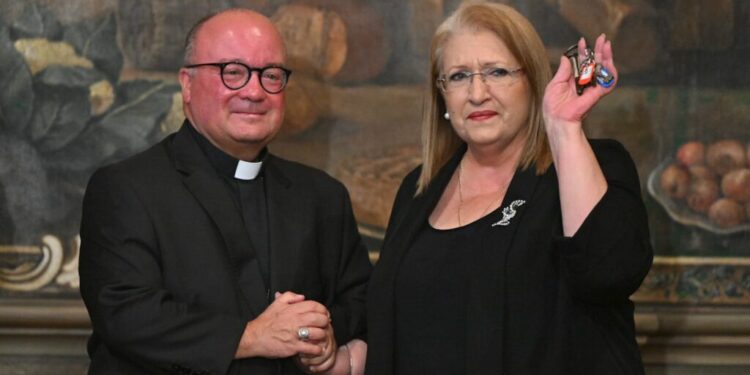ROME – Earlier this month the Archdiocese of Malta formally handed the keys of a sprawling complex that has until now served as a home for the elderly, to an arts center that assists disabled children and young adults.
The 17th century property, known as the Dar Saura, is located in Rabat, Malta, and until now has served as an assisted living home for the elderly.
However, on July 5 the property was signed over to the Malta Trust Foundation, which will relocate its Villabianca project to the 5,500-square meter (59,000 square feet) complex, which is worth around 25 million euros ($27 million), for a period of 65 years.
Villabianca is Malta’s first Center for Music and Arts, and was established by the Malta Trust Foundation to provide music therapy to children and young people aged 5-35 with disabilities who have limited access to artistic experiences.
The center serves children and young people with Down Syndrome, autism, and those with visual impairments, as well as other conditions, offering specialized music therapy tailored to individual needs with the help of music therapists.
On July 5, an official signing ceremony was held in which Archbishop Charles Scicluna of Malta and Marie Louise Coleiro Preca, chairperson of The Malta Trust Foundation.
“The best use of Church property is when it is destined for a social purpose, especially helping those who need the most support,” Scicluna said on that occasion, according to an article published on the Archdiocese of Malta’s website.
He voiced hope that with the Malta Trust Foundation, the property “will become a state-of-the-art hub empowering children and youth with disabilities to engage with their skills and discover and nurture their full potential through music and the arts.”
Likewise, Coleiro Preca called the agreement historic, saying it would position Malta as a Mediterranean hub for young people who have struggled to fully develop their potential, either due to disadvantage or disability.
“This is a landmark agreement, and we are deeply moved by the Church’s gracious gesture,” she said, saying her dream “is to see this hub become a one-stop-shop for families to see their children with disabilities thrive; a place where they can grow, develop their abilities and be empowered to go out into the world.”
Accomplishing this “will demonstrate that every one of God’s creations has a purpose,” she said, saying another dream of hers is that Malta would “address the gaps and challenges children and young people with disabilities face from a social perspective, and which are a barrier to their quality of life.”
“I truly wish we can change the lives of these children and transform the general mentality so that everyone understands their vast potential. My dream is that every child in our country, whatever their abilities, finds access to the support needed to reach their full potential,” she said.
Coleiro Preca presided over the opening of the Villabianca Center for Music and the Arts in November 2021, and in less than a year, it reached full capacity, with an additional 150 children requesting to join.
The center currently has a waitlist of 250, however, when it opens the doors of the Rabat property in two years’ time, after renovations are completed, it will be able to host 500 children and young people undergoing therapy with the assistance of music, art and dance.
Among the planned renovations of the property are the construction of an occupational therapeutic center, a petting zoo, a multi-sensory room, and multipurpose halls for training. The complex will also include studio apartments to house foreign therapists and professionals working at the hub, as well as space for workshops.
The Malta Trust Foundation is expected to draw on EU and public funds for the restoration and upgrading of the property, including renovations of the chapel it houses dedicated to Saint Nicholas, which is expected to cost around 10 million euros. ($10,800.00).
A cafeteria and restaurant will also be opened that the Archdiocese of Malta will be “financially accessible” for families, and which will be run by young people with disabilities.
The property itself dates to the 17th century and was named after Maltese doctor Nicolò Saura, who in 1654 allocated his entire estate to the building of a hospital.
An architect by the name of Lorenzo Gafà was responsible for building the complex in Rabat, which has become a recognizable local landmark.
In the mid-18th century, the property and its administration were given to the Catholic Church, which entrusted the facility to the Sisters of Charity, who ran the hospice and cared for its roughly 65 residents until 2002.
Earlier this year, the 45 remaining residents were moved to more modern facilities, as the Dar Saura, according to the Archdiocese of Malta, could no longer meet their needs without significant renovations.
The 65-year commodatum loan between the archdiocese and the Malta Trust Foundation was meant, according to the archdiocese, to secure the buildings renovations while also preserving its role as an empowerment hub for the needy.
In 2019, the archdiocese handed over its Adelaide Cini Institute in Santa Venera to Hospice Malta, which is currently converting the facility into a state-of-the-art complex called St. Michal Hospice offering palliative care.
At the July 5 signing ceremony for the Dar Saura, Scicluna expressed the Church’s commitment “to the seminal Gospel narrative of the parable of the Good Samaritan. It reaches out to people in need and offers services and care and shares its heritage to empower others to do the same.”
Follow Elise Ann Allen on X: @eliseannallen
Credit: Source link




